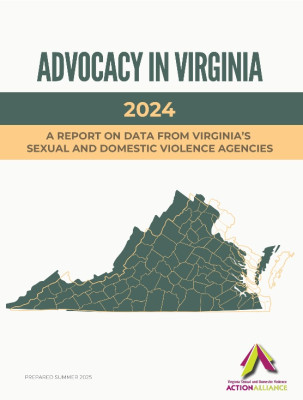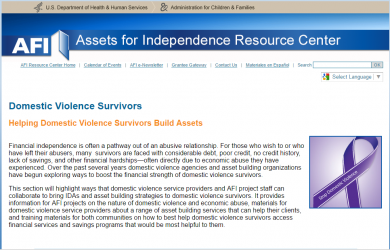Resources Library: Advocates
Start a Search:
Advocacy in Virginia 2024

Each year, we compile and publish an annual Advocacy Data Report that highlights the impact of our statewide network of sexual and domestic violence agencies. These reports provide a comprehensive look at the services delivered, the needs of survivors, and emerging trends in the movement to end sexual and domestic violence in the Commonwealth. By tracking this data, we help inform policy, guide funding decisions, and strengthen our collective advocacy for a Virginia where all people are safe, seen, and supported.
To download the most recent report from 2024, click this link.
Allies in the Struggle: Intersectional work as a trauma-informed response and prevention
This webinar, originally broacast in 2015 and presented by the Action Alliance's own Kate McCord, was designed for aspiring white allies interested in deepening their understanding of the connections between racial justice work and domestic and sexual violence intervention and prevention work. Topics included: how disparities created by institutional and systemic expressions of racism may affect survivors of color, why an intersectional approach is integral to a trauma-informed response and building trauma-informed prevention programs, and specific examples of how the Virginia Sexual and Domestic Violence Action Alliance has integrated a racial justice lens into various aspects of our work.
Click here to view the webinar.
Are Victims Services Programs Liable for Criminal “Harboring” When They Work with Immigrant Survivors of Crime?
Community-based crime victim advocacy programs that provide services to undocumented immigrant survivors of crimes can minimize risks to their program, funding, employees, and clients by adopting and following policies that take the laws on harboring undocumented immigrants into account. This Advisory answers common questions about providing shelter and other program services to undocumented victims, describes the law and federal policy (as of the Advisory’s publication date), and proposes best practices for programs, but it is not legal advice. Immigration and criminal laws vary from region to region, and federal immigration enforcement policies are constantly changing. Programs should analyze their program-specific risks, their community’s particular needs, and the laws in their jurisdiction—including legal duties associated with an agency’s funding sources—as they design or update program policies. Consulting a local immigration attorney with criminal law experience is highly advisable.
Assets for Independence Resource Center: Domestic Violence Survivors

The Assets for Independence Resource Center (AFI) is housed under the Administration for Children and Families under the U.S. Department of Health and Human Services. The AFI Resource Center provides information on AFI programs and Individual Development Accounts (IDAs). The AFI Resource Center provides a Domestic Violence Survivors Toolkit which includes information for service providers and survivors about how financial independence can be a pathway out of an abusive relationship. The information on the AFI Resource Center website includes asset building strategies for survivors and how AFI staff and service providers can collaborate to bring IDAs to survivors.
http://idaresources.acf.hhs.gov/page?pageid=a047000000Bmr7F
Barriers to and Promising Practices for Collaboration between Adult Protective Services and Domestic Violence Programs
Barriers to and Promising Practices for Collaboration between Adult Protective Services and Domestic Violence Programs is published by the National Center on Elder Abuse and the National Adult Protective Services Association (NAPSA). This report recommends that Adult Protective Services (APS) and Domestic Violence Programs collaborate on providing services for older adults experiencing domestic violence. Included are potential barriers to collaboration as well as examples of successful collaborations and initiatives.

